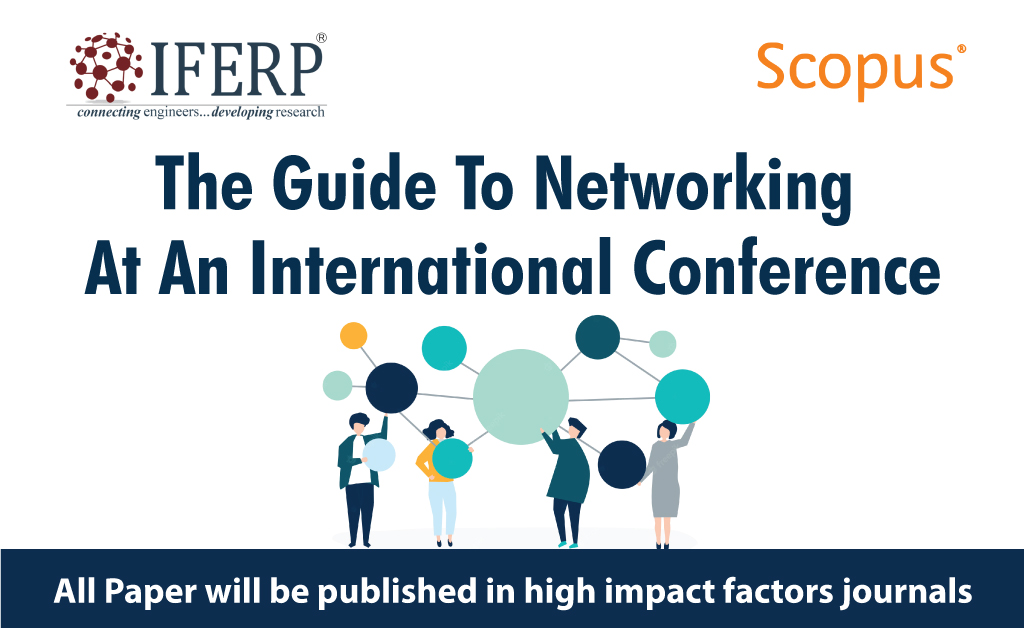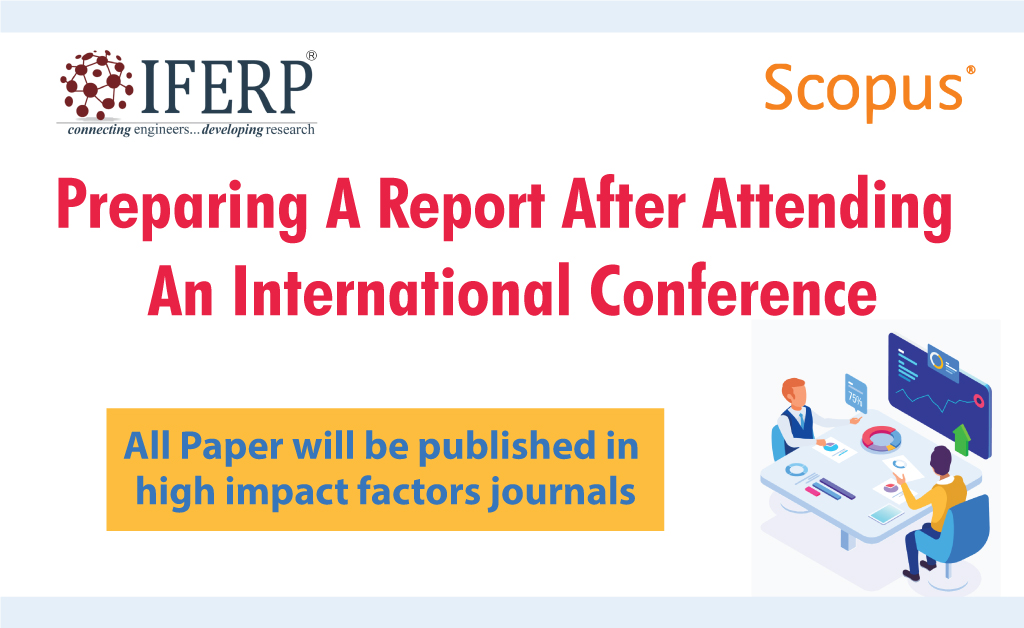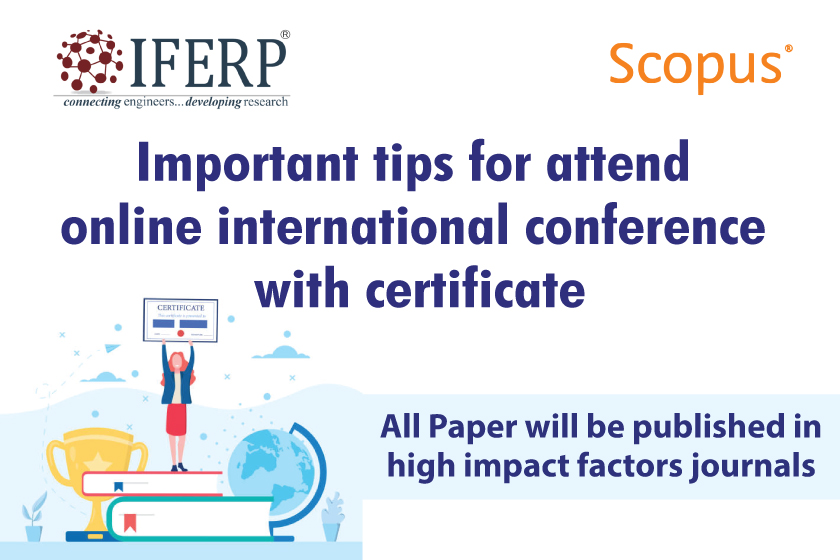It can be tough to understand what to do at an international conference. Whether you are attending a college conference for the first time or have attended several, these can be potentially stressful events. It is therefore important that you take the time to prepare well and, more importantly, know what this preparation entails.
Having detailed plans about –
- who you’d like to meet,
- your overall goals, and
- the sort of knowledge you want to gain,
- will help you gain maximum benefit from your conference attendance.
Detailed below are some of the key things you should do to prepare to attend a 2022 educational conference.
Academic conferences get bad press. For regular academics, it’s where the simple becomes incomprehensible. For your supervisors, these are places where valued colleagues show up.
For modern-day scholars (especially young ones), international conferences provide an opportunity for their theses to face the scrutiny of the outside world, an essential part of joining the conversation of their academic peers, finding out where their research stands and getting real feedback.
Despite this promise, most international academic conferences are essentially esoteric and certainly not easy for the uninitiated. Nonetheless, the following might prove to the helpful –
- Search all conferences and papers that will be presented.
- Prior to the conference, be sure to thoroughly research all the papers and speakers who will be attending.
This will help you decide what information will be most useful for you and your area of research and means you won’t miss key opportunities to connect with relevant people.
Keep in mind that academic conferences will have a range of scholars presenting their work, from well-known ones to those just starting to break into the scene. Try not to gravitate only towards academics whose work you know well or those who have already made a name for themselves. Instead, give lesser-known names a chance by researching their work before the conference and deciding if their conference is worth attending.
- Bring Along An Audio Recording Device To Record Key Speeches That You Can Refer To Later On
- Conferences bombard delegates with an enormous amount of information in a very short time.
- This can make it tough to digest all the information provided, and “information fatigue” can cause you to miss key insights that could really benefit your studies or research.
- Also, although most speakers provide slides to refer to after the lecture, these can be harder to follow without the oral explanation of the research.
- Taking a recording device to every conference will give you the best possible chance to digest all the information presented at the conference.
- This way, you’ll definitely have the freedom to refer back to key points from the presentations when you are back in the comfort of your home and have more brain space to process all the information.
- It will also help you write your conference report with more ease.
- Make Use Of The Conference’s App (If There Is Such A Thing)
- On the basis of the size and scale of the international conference, you can use a mobile app to assist you in making the most out of the conference.
- Conferencing apps can help you eliminate the mental clutter that comes with attending these types of events.
- They can help you organize your notes, record speeches, and even communicate with other delegates.
- Prepare A Tiny One-Minute Presentation About Your Research For Those You Come Across & Greet
- Whether you present your own work or not, academic conferences are the perfect place to network and expand your relationships.
- This is why it is important to ensure that your own research is well-articulated and rehearsed before you take part in a physical conference or even an upcoming online international conference.
- Work on a succinct and engaging pitch that focuses on inspiration, your methodology, and your next destination.
- This will give you a better possibility of communicating your work to other delegates in a compelling and succinct way, increasing the potential for collaboration and connections.
- Determine Exactly How You Plan On Reaching The Conference
- International academic meetings can vary in size.
- Either way, it’s crucial that you understand the logistics of getting to each conference you want to attend.
- Before attending, be sure to research how to get to the site and how you navigate between conference rooms while you’re there.
- On certain occasions, lectures may be held in different buildings or academic papers displayed elsewhere, so you will have to have a clear idea of where you need to go in order to avoid late entries or missed chances.
- Determine Exactly Whom You Wish To Work With
- Planning who you wish to connect with at an international conference is a great way to ensure you meet the people who will benefit most from your research or study.
- Networking itself can be quite daunting for many of us.
- Undertake All The Legwork Necessary
- You need to decide if this is the right international conference for you, in terms of scope and timing.
- Every discipline will have a hierarchy, but more importantly, it helps to make the decision based entirely on the Scopus indexed journals associated with the conference; the conference is part of your publication strategy.
- The key is to adapt your work to the theme; you have to try hard at this bit.
- Timing is knowing where you are in your research journey, knowing if you are ready.
- Some try step-by-step strategies, which can prove to be really successful.
- Others tend to put all their eggs in the same basket, “a major international conference”, just before submitting their thesis.
- Avoid The Temptation Of Stuffing Your Entire Thesis Into One Condensed Article
- In a conference paper, less is more.
- A finding is enough if you are addressing a theoretical gap in current research.
- If you’ve got implications for practice, then that’s a definite and useful bonus for some of the mixed academic/practitioner conferences you often have in health care.
- Strategize Like Your Life Depended On It
- It begins with your choice of accommodation – don’t settle for the conference hotel if all that’s on offer is a complementary conference dinner.
- Treat this like you would as an independent traveler – find the best place to stay within walking distance or easy-to-access public transport to the venue and downtown.
- Book early, save money.
- Arrive one day before the conference.
- Doing this can prove to be invaluable. You become the local expert for your conference buddies who arrive late.
- Plan Out Exactly Which Sessions You Mean To Take Part In
- Identify the sessions you wish to take part in before arriving.
- You can put a plan of each day on small index cards, stapled with the notes for your paper.
- Register early and make use of the opportunity to find the room in which you present.
- Wear your badge; it assists people in remembering your name and offers you an excuse to look for their badge.
- Talk to people, obviously not the rushing ones, but your college fellow riders.
- Go up to them and ask them a question to get the conversation going.
- Breathe and savor the entire experience.
- You can’t attend every session of a conference, and if you attempt to do too much, you’ll end up late, stressed, and too exhausted to attend properly.
- Check the conference schedule before you go and choose the essential sessions you really want to attend, then give them your full attention.
- Write your own schedule if you are very busy, with room numbers, so you know where to go. In a large-scale conference, focus on the particular topic or area that interests you and try not to get sidetracked because of all the other topics.
- Finally, try to ensure that you get eight hours of sleep per night so that you are not too tired to participate in the sessions.
- Bear In Mind That Not Everyone Will Be Into Your Research & Presentation
- Take every opportunity to discuss your work, both inside and outside of your session.
- Know what you want in the comments and say it.
- Be ready to throw an accurate while you’re grabbing your lunch or waiting in line.
- You’d be amazed at the quality of feedback you can receive and how it helps you develop your ideas.
- This is also a good way to identify your academic travel companions.
- Attempt Networking With People Who Are Entirely Unacquainted With You
- During conferences, there is a strong desire to run into colleagues from your home university.
- It is strongly recommend that you resist the urge.
- Additionally, professors in your department also usually have their own agendas.
- It is advised that you use the conference to make “new friends”.
- They are your future co-authors and potential research collaborators.
- Yes, make it a point to attend the conference dinner and don’t expect the meals to be great or worth the exorbitant cost.
- Sit down at a table with interesting people you just met or don’t know.
- And, of course, don’t forget to dance.
- Acquaint Yourself With The Layout Of The Conference Venue & Immediate Vicinity
- Academic conferences aren’t just a place to learn about new research and meet fellow scholars – they’re also a fun opportunity to see a new location.
- Undertake a little research on the area before attending the conference and get ideas for top attractions to check out or places to eat and drink.
- Your conference experience will be far less stressful if you find out in advance about all available transportation options and how to get between your hotel and the venue of the conference.
- If you arrive much before the conference starts, you can take the time to familiarize yourself with the area and get comfortable in the conference.
- Plus, if you’re full of local attraction knowledge, you’ll always have something interesting to chat about with fellow attendees.
- Customize Your Presentation To Appeal To Your Audience
- Whether you’re delivering a poster presentation or a lecture, don’t just repeat the same spiel you always give to your colleagues in the department.
- You must modify your material according to the level of knowledge of the audience because some people present will come from a different field than yours.
- You can ask your audience if they know about your topic – especially when presenting a poster to a small group; this can assist you in gauging the level of expertise you should be reaching out to.
- If you are giving a conference, do not exceed the time allotted to you.
- Practice speaking and time yourself to make sure you’re within the allotted time and remember it’s good to be a little late as it allows more time for discussion.
- But going over time is frustrating for your audience, rude for the person coming after you, and stressful for you.
- Reduce your presentation to the essentials, and do not procrastinate.
- Every time you give a presentation, write down any comments or questions people ask afterward.
- This can be an extremely useful source of feedback regarding your research, but you’ll need to write it down, so you bear it in mind when you get home.
- Try Talking To As Many Professionals As Possible
- Conferences are amazing places to network with other scholars and researchers in your field.
- Get involved by asking questions after discussions, contributing to discussions, and attending social events.
- You can learn about the latest unpublished research and meet people who may contribute to your work (increasing the possibility of getting published in popular journal publications) in the future.
- Don’t miss conference dinners or social events, as these events are where a lot of the networking takes place.
- Refine your elevator pitch, which is a brief two-sentence description of your research that you can share when people ask about your work.

- The Guide To Networking At An International Conference
- As pointed out already, academic conferences provide the perfect opportunity for scholars to network with their peers.
- They can help you energize your academic network and plan future collaborations.
- However, networking is always more difficult in real life – especially if you are not very experienced in this field.
- To make networking easier, the following tips for networking at an international academic conference have been highlighted.
- Determine Exactly Whom You Wish To Meet With Before The Start Of The Event
- It is important to plan who these people might be before the conference so that you offer yourself the best chance of being able to network with them.
- Prepare A List Of All The People & Talking Points
- This process will give you a clear goal and make the process much more methodical. It will even make networking a more fruitful experience, as you’ll be more likely to talk to more relevant people.
- Take a look at their profiles and get familiar with their appearance if you don’t have a clue about what they look like so that you’ll be able to spot them in the crowd easily.
- If you don’t necessarily have a specific person you want to connect with but want to network with people from a certain field of study or a particular organization, you can also plan ahead.
- Research the conferences that these people are more likely to attend and be sure to attend.
- Don’t hesitate to ask questions at the end of the discussions and use this opportunity to announce to the room that you are looking to network with people with similar interests.
- This way, more people will approach you.
- Set Up Meetings With Key People Well Before The Conference Begins
- Arranging meetings beforehand can facilitate the idea of networking, and it is absolutely appropriate to do so.
- If the people you wish to connect with are listed as attendees or speakers, you can even email them ahead of time to set up a meeting.
- It can be a coffee or a drink, or even joint participation in a particular conference.
- Connecting with them through email or another platform ahead of time also offers you the opportunity to describe your education and research ahead of time, allowing you to enjoy a more comprehensive discussion when you finally interact in person.
- Attend The Smaller Seminars Within International Conferences
- Some conferences tend to have smaller seminars that involve more open discussion.
- These are great places to find people to talk to, as more open conversation is encouraged among delegates.
- They are also great places to discuss academic papers.
- Keep Track Of All The People Whom You’ve Met With
- Once you’ve done a lot of networking and met people at a conference, follow up with them in the days that follow to solidify the connection.
- Also, don’t forget to carry business cards with you to hand out with your contact information so these people can get in touch with you if they have questions about your work.
- Finally, a good tip if you’re doing a poster presentation is to prepare small A4 or A3 versions of your poster that can be handed out to people – and don’t forget to include your contact details.

- Preparing A Report After Attending An International Conference
- There is a lot of data that needs to be digested after attending a conference.
- You may even be asked to pass on your findings to colleagues or peers who were unable to attend the event.
- Writing a report after attending a college conference will help you retain key information and share clear findings with others.
- This is unlike research article writing, where you perforce require strong academic writing abilities.
- What Does Preparing Such A Report Typically Involve
- Preparing an academic conference report is a really useful and simple thing to do.
- The idea is to include key information about the event, speakers, and conference themes, as well as the contact details needed to answer any questions.
- It’s always best to do this as soon as possible, right after the conclusion of the event, when the details are most up-to-date.
- A conference report will necessitate some planning ahead of time to ensure you get all the right information while you’re at it.
- So, before you go to an in-person academic conference or an upcoming online international conference, gather the following information –
- The conference organizers and their journey
- The purpose/theme of the conference
- The number of people present
- Where was the conference held
- Information on key speakers/important people. (include details of designations, disciplines, universities, research institutions, etc.)
- Describe the topics each speaker focused on in their articles/discussions
- Include photos from the event
- Links to presentations (typically, speakers will share their slides)
- Phone numbers, email IDs, and social IDs of all key stakeholders.
- Once you’ve got all this information, you can put it together either in a Word document, a Google Doc, or a presentation that you can store for reference and share with peers at any time.


